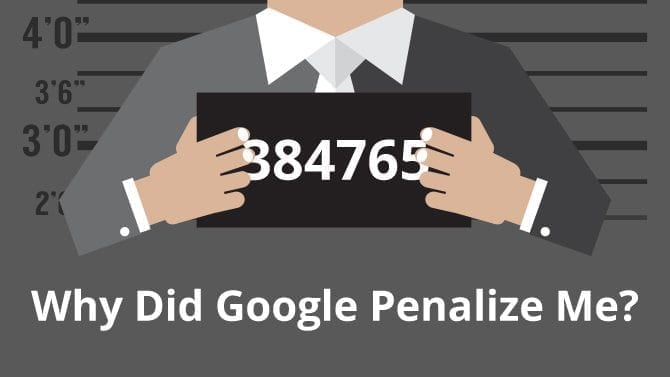
You noticed your position on the SERPs has dropped dramatically, and you have a sneaky suspicion a penalty may be to blame. But what did you do wrong? You thought you always followed the proper SEO techniques, and you are puzzled by this occurrence. Well, according to KISSmetrics, there are more than 50 reasons you could have been penalized, but these five are most likely to be the culprit:
Purchased Links
The more inbound links your site receives, the higher your PageRank score, which usually means you show up higher on the search engine results page (SERPs). You get inbound links when people value your content, your brand, have listings or news articles about you. Thus, they naturally link to your site from theirs. (See below where we have linked out to Copyscape and Hubspot!) But if you have ever paid for links, even if it was years ago, that could be the reason for Google’s penalty. Google has no patience for paid-for links because they cheat the system, and it is always on the hunt to take them down. Finding who/what links to your website and disavowing that link it a job for ZGM, or another reputable SEO company.
Repeated Content
If your site contains any duplicate content, your ranking could be suffering because of it. When you have the same content, they both show up for the same keywords, and since Google has no way to decipher which one is better, it disregards the newer one, thinking that the older one is the original. So make sure everything you post to your website and blog is 100% unique. Some duplicate content is accidental, too, so it’s wise to run everything through a plagiarism checker, like Copyscape or Hubspot, just to be safe.
Stuffed Keywords
Yes, of course you need keywords so that Google knows what you are taking about, but the truth is most keywords end up in your articles at least three to four times naturally—and there is a fine line between what Google considers acceptable and unacceptable. Too many keywords are a red flag for Google, because it usually means poorly written content (a.k.a. content Google doesn’t want to show its users). So take a look back at your blogs, and if you use your keywords to the point where the articles feel stuffed, you might want to do some editing.
Destroyed Coding
Again, Google is all about showing the best content to its users, so it gets pretty upset when your link leads to an error code. Of course, 404 errors (page not found) are a big no-no, but even a 302 error (temporarily moved) is looked down upon. If you need to move a page, use a 301 redirect. And if you see a 500 error (internal server error) you better figure out why ASAP.
Disjointed Mobile Website
As of April 21, if your site is not mobile friendly, you have likely seen a huge decrease in website visits. That’s because they have upped the amount of clout your mobile friendliness plays in their algorithm. You need to change your website, and you need to change it now. A responsive website design is your best bet because your site will adjust flawlessly from desktop to mobile to tablet.
Google is pretty picky, and it knows what it wants. Luckily for you, we do too. We constantly study Google’s algorithm and penalties so we can be proactive about making changes when necessary. If you feel like you might be fighting the uphill battle that is a penalty, contact us today.








